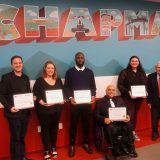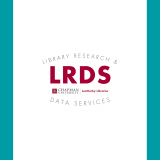Introducing the Inaugural Temianka Archival Scholar, Mitchell Tanaka
November 17, 2021
Earlier this semester, the Leatherby Libraries conducted a search for students interested in the Temianka Archival Scholars Program. Our search was focused on students interested in the fields of archival study and/or music history, and we were delighted to select Mitchell Tanaka as our inaugural Temianka Archival Scholar. Over the 2021-2022 academic year, Mitchell will write a few blog posts chronicling his work with the Henri Temianka Archives. In this first post, we chatted with Mitchell to learn more about him and his interest in the program.
Please introduce yourself and what you are studying at Chapman.
Hello! My name is Mitchell Tanaka, and I’m this year’s Henri Temianka Archival Scholar. As a senior at Chapman, I am finishing my major in Television Writing & Production and minor in History.
What is the most exciting part of this fellowship for you?
All of the small discoveries during the research process are the most rewarding to me. It feels a lot like detective work. Maybe I’ll find something that connects Temianka’s practices to his contemporaries, or read a letter that explains his philosophy on conducting. There are plenty of tidbits from Temianka that may have appeared trivial at the time, but now feel like puzzle pieces that connect into the broader history of art and music.
I think there’s also something very appealing to me about physically handling many of the Temianka archive materials. Being able to hold each letter, program, and newspaper clipping in my bare hands lights up a part of my brain that goes, “Whoa, you’re holding a piece of history!” It feels a lot more personal than merely reading about Temianka’s story.
What drew you to this fellowship in particular?
I’ve always been interested in the chance to tell a compelling story, and I think this project provides that same kind of opportunity. It may appear very different from my work as a filmmaker, since we’re essentially unearthing a story as opposed to writing one from scratch.
But ultimately, I’ve found that the Temianka fellowship is driven by the same kind of human intrigue that’s abundant in film. Having the chance to examine the life of someone so intertwined with the history of performance, music education, politics – how could I not want to be a part of that?
I know from keeping up with The Panther that you’re quite the journalist. How do you see the relationship between journalism and archival work?
At the end of the day, both kinds of work revolve around curiosity and asking questions. Sifting through archival materials and scouring libraries for information feels a lot like doing research for a feature article or a profile piece.
There are unique challenges to examining a subject from the past, though. I’ve found that tackling gaps in material or making historical connections as an archival scholar can help me improve the way I approach interviewees or dig up background information as a news writer.
What are the three most interesting items or images you’ve come across so far in your work on this fellowship?
Henri Temianka had a pretty lengthy correspondence with several writers from the Los Angeles Times, and a lot of that correspondence reveals his perspective on the role of education in music performance. His style of commentary proved controversial for many of the music critics he wrote to, and it’s fascinating to see in each letter where people stood on the topic.
Some letters also detail Temianka’s work to free his parents from a French concentration camp in World War II, which are some of the most riveting reads in the entire collection. It’s easy to see in Temianka’s later works just how much the war affected him, and those letters make it explicitly clear why.
Seeing letters from other historical figures, like Ray Bradbury, Richard Nixon, and Gregory Peck provides some insight on just how connected Temianka was with names one may not associate with him right off the bat.
What is the most surprising thing you’ve learned so far about Henri Temianka?
It’s very interesting to observe how outspoken Temianka was in writing to officials about conflicts like the Vietnam War or the 1967 Arab-Israeli War. Despite the fact that my research focuses on Temianka’s music, reading his thoughts on large global events helps me get a better portrait of his values as a person. Sometimes I can see those values seep into his performances, too.
Thanks so much for chatting with us, Mitchell, and we look forward to reading more from you as you work closely with our Coordinator of Special Collections & Archives, Annie Tang, and delve even deeper into the archives!



